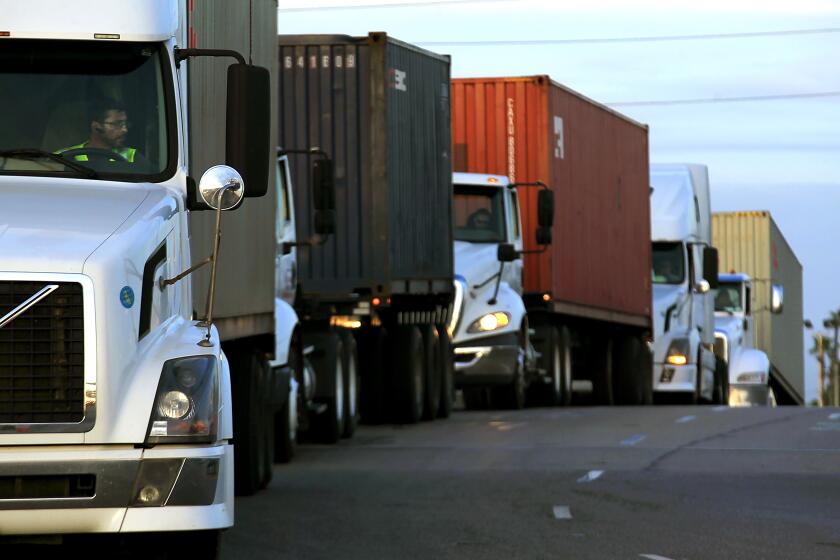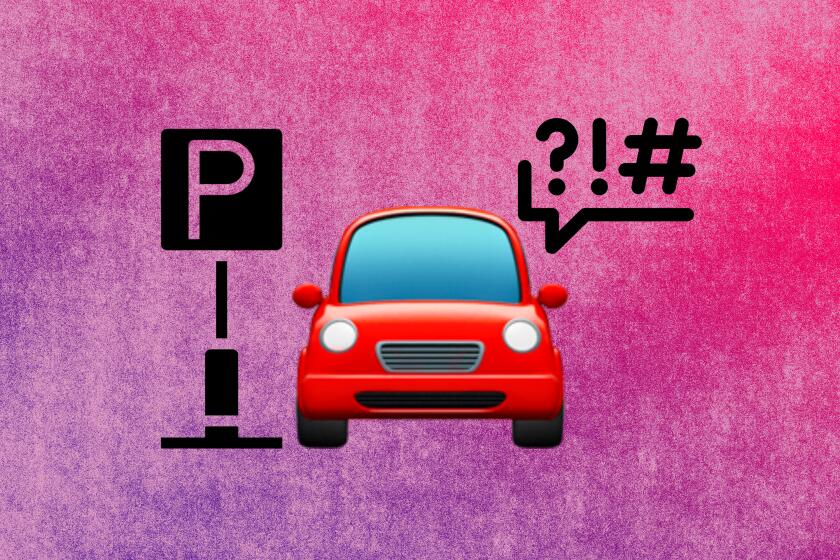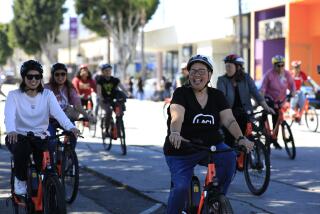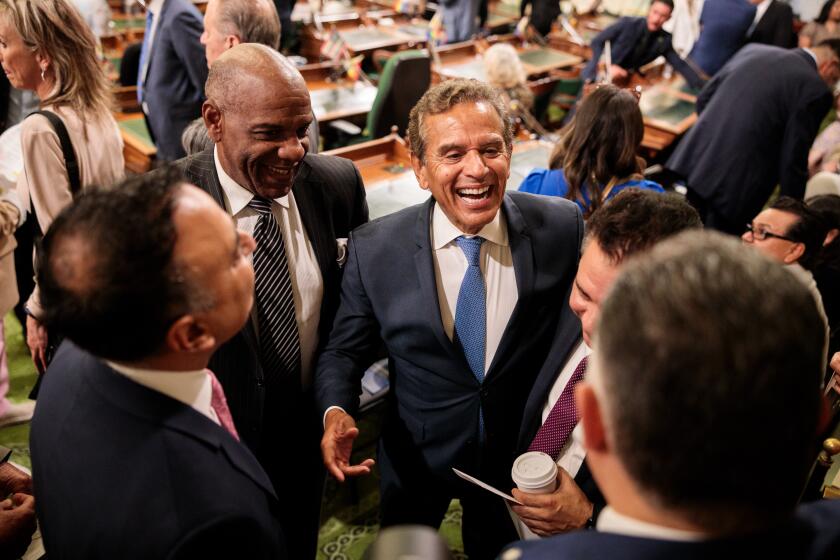This L.A. startup is using cargo e-bikes to solve urban traffic
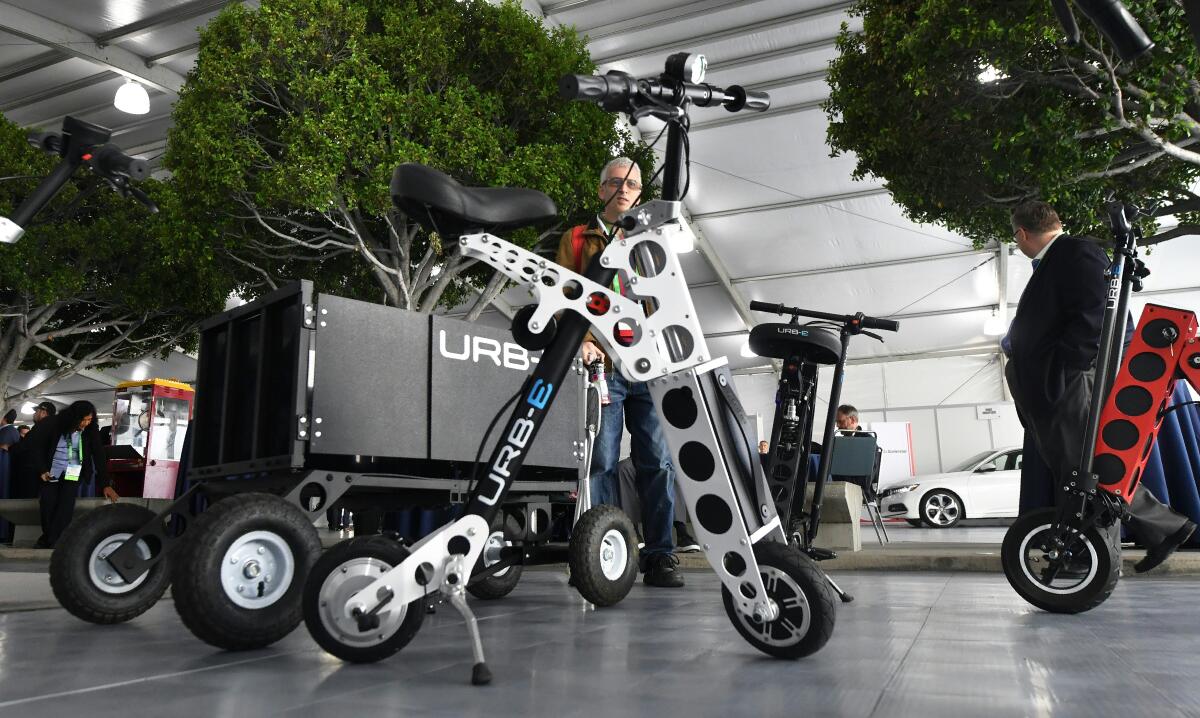
On city streets, on most days, Amazon delivery vans, UPS trucks, Ubers and vehicles for instant delivery services all vie for space. A Los Angeles-based company is aiming to solve the problem of urban congestion and the emissions that come with it by swapping out the delivery trucks with cargo e-bikes.
Urb-E is carving out a high-density niche in the market for electric commercial vehicles, which market intelligence advisory firm Guidehouse Insights says is expected to hit $370 billion by 2030. The company wants to build an ecosystem around cargo e-bikes, aiming to expand from 50 to 500 of them by next year.
“Cargo e-bikes let delivery workers avoid car traffic congestion, reduce pollution and are safer vehicles on our streets than trucks,” says Sarah Kaufman, associate director of Rudin Center for Transportation Policy and Management at New York University. “Cities all over the world are starting to reshape themselves for smaller-form vehicles and more human-powered transportation; cargo e-bikes fit perfectly into this vision.”
Urb-E, which started out as a company that made mini e-scooters, is pivoting to monetize the demand from companies that need their own low-emissions delivery systems. Urb-E makes its own workhorse e-bikes in China, which are geared to haul large loads (800 pounds) at low speeds and fit into a parking space with 20 folded containers. The bikes feature a double-wheel and brake system like those used in aircraft. A hitch and suspension allow for more stability on fraying road infrastructure in their first locations of New York and Los Angeles.
Urb-E provides the vehicles, but not the drivers. The startup trains clients on how to put their own drivers on the e-bikes and offers an e-bike valet service to help manage charging. It’s an experiment, but one thing is for certain: This isn’t another delivery company bringing you lunch. It wants the bigger market of high-volume cargo for companies. Containerized boxes make it easier to move cargo off of trucks coming into the cities and onto trailers for e-bike delivery, Chief Executive Charles Jolley said.
“We’re really specifically not focused on ‘get me a burrito, a coffee, a toothbrush in 15 minutes,’” Jolley said. “We’re trying to replace trucks and vans with something that’s 90% less energy.”
The company’s clients have varied from UPS to Square Roots, which had been delivering its produce grown in the company’s vertical farm in Brooklyn by rigging a trailer to consumer e-bikes and loading it up with veggies. One Urb-E co-founder described that as “like trying to use a Prius to do the work of a tractor.”
Record diesel prices are slamming consumers in hidden ways. That’s because diesel drives the economy, fueling trucking, agriculture and other major industries.
UPS used Urb-E bikes in a trial as part of its expanding “last mile” logistics solutions that involve more than 30 projects, and the company continues to look for urban logistic solutions as part of its bid for carbon neutrality by 2050, said Luke Wake, UPS vice president of fleet maintenance and engineering.
Square Roots, which is backed by Kimbal Musk, the brother of Elon Musk, said the new partnership helps guarantee fresh food is available year-round, which wasn’t necessarily the case amid pandemic-era supply chain disruptions. Urb-E’s containerized system has the capacity for insulated cold storage bags to protect fresh produce. The bikes can be used for about 100 local grocery stores in the New York area, which are within five miles of the group’s farm. A recent Instagram post crunched the numbers: 30 pounds of carbon saved on 25 miles per week.
Urb-E was started in 2012 with ambitions of making the world’s most compact e-vehicle at the time. The co-founders came up with a foldable mini e-scooter with a range of 20 miles and a top speed of 15 miles per hour, which had some success in places such as the campus of co-founder Peter Lee’s alma mater, USC.
The company had created a new vehicle for micromobility, but scaling up required entering a crowded race with deep-pocketed competitors including Lime and Bird.
“Our choices were to die, or to take all these learnings we had identified and pivot,” Lee said.
Parking in Los Angeles is about luck and skill. So save time and money by learning these hacks with yellow curbs, green curbs, holiday rules, valet and more.
Urb-E’s co-founders had noticed that the cargo wagons they had started supplying to a local fire department along with the scooters were in high demand, and even UPS was putting in requests for them. Lee and his team took a step back — what if they started designing not just scooters but a whole electrified ecosystem for deliveries that could replace urban trucks, down to the logistical hubs, mechanic shops and fueling stations? They could lean on co-founder Sven Etzelsberger’s design expertise, from years leading Porsche’s team, to make a fleet of e-bikes for heavy loads, compact bike trailers for containerized cargo and the charger hubs to power them.
Delivery is just one niche in the blossoming e-cargo bike market, which varies from rigs for families and commuters to delivery programs by UPS, which developed with Rytle its own custom-made fleet of cargo e-bikes in Europe. Matt Roorda, an expert on urban freight at the University of Toronto, plans to study that city’s newly approved pilot program for large e-cargo bikes, including the potential for freeing up city parking. He says the introduction of the bikes could bring new challenges: handling safety in busier bike lanes and determining where to put new charging hubs. A bill in the New York state Legislature to allow for wider cargo e-bikes is a start to addressing the issue, NYU’s Kaufman said.
Former New York Mayor Bill de Blasio began a pilot program for cargo e-bikes in 2019, which included freight companies Amazon, DHL and UPS. Urb-E’s swerve toward cargo started rolling out last year. The startup’s transformation caught the eye of Jerry Yang, the Alibaba board member who co-founded Yahoo. Yang, a user of Urb-E’s mini-scooters, had come on as an early investor through his AME Cloud Ventures and invested again, drawn by the company’s ambition of creating a compact container delivery network to replace trucks and small electric vehicles. Urb-E also counts UBS and Acadia Woods as backers.
Cars and trucks weren’t cutting it as a solution amid rapid urbanization, said Yang, whose bet on Alibaba in 2005 brought one of the biggest payoffs for Silicon Valley investors in China. Cargo e-bikes, like drones and autonomous robots, probably are the future for cities, where the problem of last-mile delivery is the hardest part of the supply chain to solve at scale, Yang said by email.
“Every e-commerce company today is wrestling with how to meet the huge increase in demand while also trying to meet CO2 targets their customers and investors are asking for,” Yang said. “There will always be some deliveries that need a truck or van, but over time a very large percentage of deliveries can be converted to new vehicles built specifically for the size and scale of modern cities.”
Bloomberg writer Eric Roston contributed to this report.
